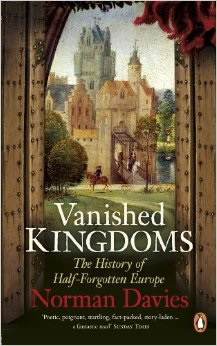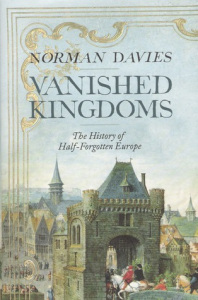
Maybe you know the feeling when you’re on a holiday in some corner of Europe, and you visit a castle and you read in your Lonely Planet guide about some ancient kingdom that used to exist there. And for a moment you are intrigued and then you slowly forget about it again because it has no bearing on your present. Norman Davies has collected all these histories in his book.
Each chapter deals with a new forgotten kingdom. So, while this is a doorstopper of a book, you can take it one chapter at the time. You can take a whole year reading the book if you want, by just reading one chapter per month. That’s more or less how I tackled it. Davies has ordered his chapters (and kingdoms) chronologically, and not all of the kingdoms are from the Middle Ages. In fact, his final chapter is about the Soviet Union, which you could hardly call a forgotten kingdom. Neither a kingdom, nor forgotten. But the rules of history and memory still apply to it.
It is really interesting how these little kingdoms form the “connecting tissues” of history, tying well-known empires together in space and time, sandwiched as they are. All the same, each vanished kingdom is a little human drama in and of itself. An experiment in successful statehood. What’s also interesting is that many of these kingdoms arose at the edges of the Roman Empire in the times when it was falling apart.
Not only in time, but also geographically, Davies ranges all over Europe, from the British Isles to far Eastern Europe. His first chapter is a nice starter, a nice typical story of a medieval kingdom lost in time. It is that of the Visigoth kingdom of Tolosa, sandwiched in time between the Roman Empire and the Frankish kings. Nowadays in France, there are hardly any signs leading to a Visigothic past, and the Frankish king Clovis who vanquished the Visigoths has been given a monumental tomb in Paris. But the Visigoth king Alaric is forgotten, even though he ruled over a larger land and the Visigoths were actually fine fellows, adopting Roman laws as inheritors of the western Roman Empire.

Davies takes special note of what is remembered nowadays. Each chapter is built up of three parts where he first takes a look at the modern lands and how they appear, and then relates the history of the forgotten kingdom, and finally searches for clues in modern times that this kingdom once existed. In the case of the Visigoths for example, the town where the Franks conquered the Visigoths still styles itself as the place “where France began”. And the Visigoth capital Tolosa gave its name to modern day Toulouse.
Not all of the “kingdoms” seem a good fit for this book. There’s an odd chapter about Byzantium that tries to summarize 1000 years of empire into 20 pages. Some chapters are about ducal areas that never really were kingdoms, and the final chapters are about Ireland and the USSR.
The meanest way to describe the book is to say that it flip flops between dry details about kings and the superfluous notes of Prof. Davies’s vacation trips. As nice as the Visigoth opening chapter is to warm up, other chapters nearly succumb under a barrage of names and details. Things get really complicated as Davies traces the old Briton kingdom Alt Clud. For about 600 years, he traces hints of the kingdom’s existence as all kinds of people push and pull for dominance, like Scots, Picts and Vikings. Davies goes off on a thousand tangents, and finally describes what the modern airport looks like when you fly in.
The last few chapters are more like rants where Davies has a bone to pick. The chapter on Rosenau is about how German the British royal family is. The chapters on Montenegro and Rusyn are about how Western nations forgot or looked down on Eastern European countries. And then there is the chapter about Ireland and how the UK is going to fall apart.
It took me forever to get through it. Maybe a whole year, doing one chapter per month. It’s all a bit much to take in, and you’ll have forgotten most of it a month later. I thought it was hard to get through; too detailed, too much focus on getting from one king to the next one. I would not recommend this book. Still, books like these give you impressions of what was where and when that linger in the mind.
Advertisements Share this:




